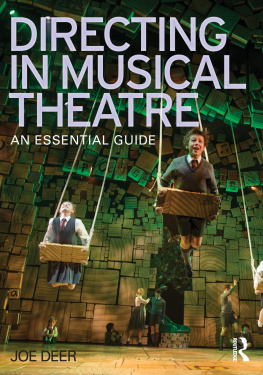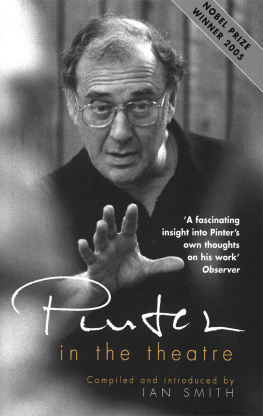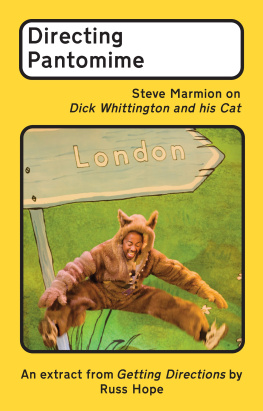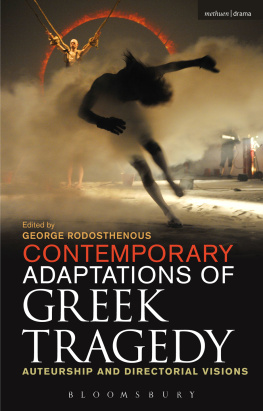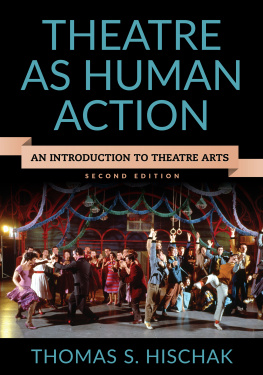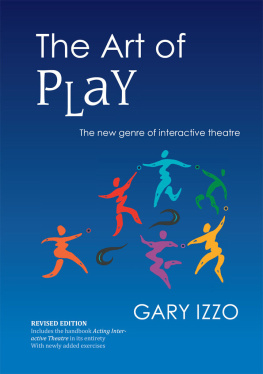Appendix:
Analyzing a Play,
Demonstrated
A POINT Sherlock Holmes never tired of impressing upon Dr. Watson was that only the facts will lead you to the truth. It is a capital mistake to theorize before you have all the evidence, he would say. It biases the judgment. You find yourself insensibly twisting facts round to fit your theories.
The task of analyzing a plays action is difficult in and of itself, but its made more so by the distractions of theme and character. Deciding too soon what a play is about the theme of the playcan bias your decisions about what happens in the playits action. By the same token, making decisions too early about who the characters arehow they feel about things and what they are capable ofcan color your perception of what they actually do.
There will be plenty of time for these other essentials. They proceed from the action, and it is a capital mistake to theorize about them before you have examined the evidence properly. But an understanding of the actionto the exclusion of every other facet of the playis the rock upon which your production must stand.
A detailed example may be clarifying. The amount of detail to be examined is part of the point to be made, but as a painstaking analysis of a single play would likely break the flow of the book proper, I offer it here as an appendix.
Edward Albees play Whos Afraid of Virginia Woolf? is a widely misunderstood play in some ways; these misunderstandings can be cleared up by a careful analysis of the play. At first glance it is easy to see the play as merely an increasingly vicious battle between George and Martha, a game in which the stakes are raised and the tactics grow uglier, until George comes up with the knockout punch. This theory of the play is facile, inadequate to the breadth of the plays concerns because it is not based on a careful examination of what actually happens in it.
Nonetheless a quick search on the Internet will display an assortment of critical commentary on the play that confirms this view of the play. Myron Matlaw, author of Modern World Drama: An Encyclopedia, writes that the play centers on a marriage marked by mutual hatred and discusses their increasingly sadistic arguments and behavior played out in front of Nick and his barren wife Honey. A synopsis of the play provided by a European university for students studying American literature explains that George and Martha engage in a harrowing battle to destroy each other and that the games they play are seriously playful imitations of the social games we play in our everyday life. A review of the film version by Damian Cannon, proprietor of the well-regarded website Movie Reviews UK, describes the ending this way: In the final act George wants everyone to play a final game where he can drop the final bombshell. The emotional fallout from this is intense and somehow [emphasis added: the use of the word betrays the fact that the reviewer doesnt follow the connection between cause and effect at this point in the action] gives rise to an exhausted calm.
These quotations, selected as typical, sum up how the play is often seen, which is also to say how it is often directed and acted. They reflect a view of the play that is shallow in its overview and downright mistaken in many of its specifics. Far from being barren, for one example, Honey is in fact pregnant, as we shall see. And I hope I am never the dinner guest of anyone who considers George and Marthas behavior to imitate everyday social interactions.
If the play is nothing more than a three-act fight between a domineering wife and an emasculated husband who finally figures out how to fix her once and for all, it is a psychological slugfest with no real meaning.
Analyzing a plays title is not usually the place to start, but Albee has given us four titles to examine, and doing so reveals something worth noticing about the plays structure. Besides titling the play, Albee has titled each of the three acts. The play title, of course, is taken from the song George and Martha heard at the party and sing to each other throughout the play:
Whos afraid of Virginia Woolf,
Virginia Woolf, Virginia Woolf?
Whos afraid of Virginia Woolf,
Early in the morning?
Virginia Woolf was a British novelist and literary critic during the first half of the twentieth century. Her name works as the sort of jokey reference that academic types would use to parody Whos Afraid of the Big, Bad Wolf? George and Martha sing this song, at first mockingly and, finally, tenderly. By the end of the playwhich is indeed early in the morningthe question in it has taken on a highly specific meaning for them. The last line of the play is Marthas answer: I am, George. I am.
We will have to come back to the question of what this meaning might be. We dont have enough information yet. But the act titles are more immediately helpful. Act One: Fun and Games. Act Two: Walpurgisnacht. Act Three: The Exorcism.
Fun and Games is pretty clear. We all know what both those things are.
The word Walpurgisnacht is less clear. So we look it up. The encyclopedia tells us that the word derives from Saint Walpurgis, a ninth-century English nun who was a missionary to Germany. She is the patroness of protection against witchcraft, and one of her feast days is May 1. According to German tradition, the night before May 1 is Walpurgisnacht, when all the witches commune with the devil. They conduct a satanic Mass which culminates in the ritual sacrifice of a human baby.
The Exorcism was originally to be the title of the entire play until Albee saw the question Whos afraid of Virginia Woolf? written on a wall somewhere. (And people say graffiti isnt art.) An exorcism, of course, is the procedure by which a persons body is cleansed of the presence of evil spirits.
Thanks to these subtitles, we havebefore we read a word of the actual playa general sense of how the playwright has structured the action. Fun and Games, Walpurgisnacht, The Exorcism: uninhibited exuberance turning into something ugly and debased, then leading to a final cleansing. Already were at odds with the idea of the play as a perverse version of Rocky featuring Martha as Apollo Creed.
Plot
George and Martha are by themselves at the top of the play, so we see that the combative nature of their relationship is constant, not something they will put on when Nick and Honey arrive. We learn in this part of the play that George and Martha have been at a party at Marthas fathers, and that Martha has invited Nick and Honey, whom she met there, over for late-night drinks. Two details that will be important later emerge in this early scene. The first is that George knows Marthas description of Nick before she finishes it: and good looking. The other is that George warns Martha, Dont start in on the bit about the kid.
Now is a good time, just before Nick and Honey arrive, to ask ourselves the Passover Question. Why is this night different from every other night? In this play, as in every play that works, there is a reason why the events of the play happen. Some event, or confluence of events, has occurred that now makes the events of the play inevitable. The plague has descended upon Thebes. The auction of the cherry orchard has been scheduled. Lear has decided to retire. Felix Ungers wife has finally thrown him out. The events of any good play are a moment of profound crisis or it would not be an interesting play to watch. Its too early in our reading of this play to say what has brought this on for George and Martha, but its the right time to start asking the question.
Once Nick and Honey are in the door and all four are making chitchat, George has trouble finding feet for his animosity. First he attacks Nick, trying to lead him into saying something pretentious about the abstract painting on the wall so he can mock him for it; but he is obliged to apologize. He turns to attacking Martha, about her taste in liquor and the way she laughs, and is allowed to do so. Then he attacks Marthas father and is corrected by the others, all three of whom find Marthas father to be a wonderful man. Notice that when Honey asks Martha to show her where the bathroom is, Nick asks Honey, Are you all right?


